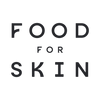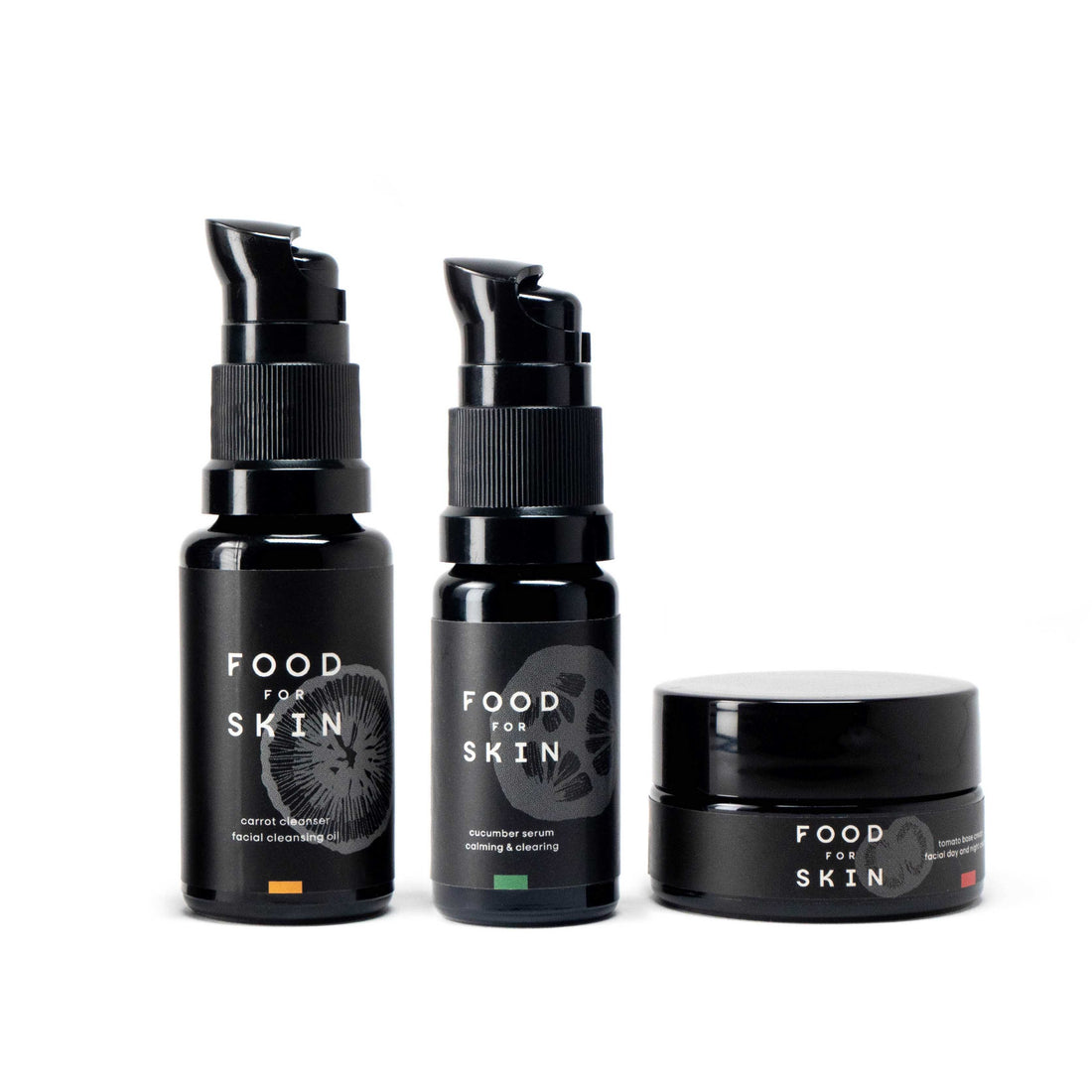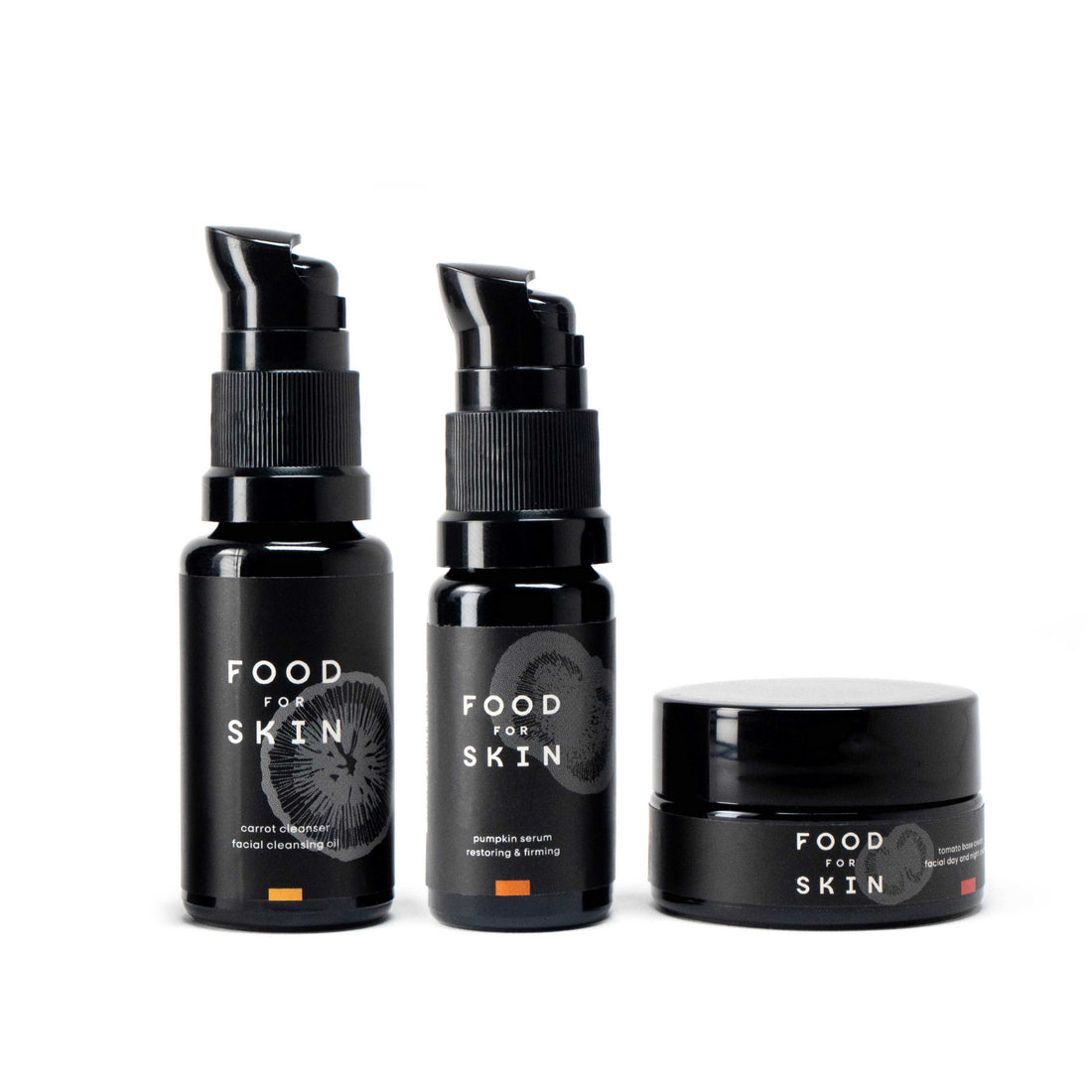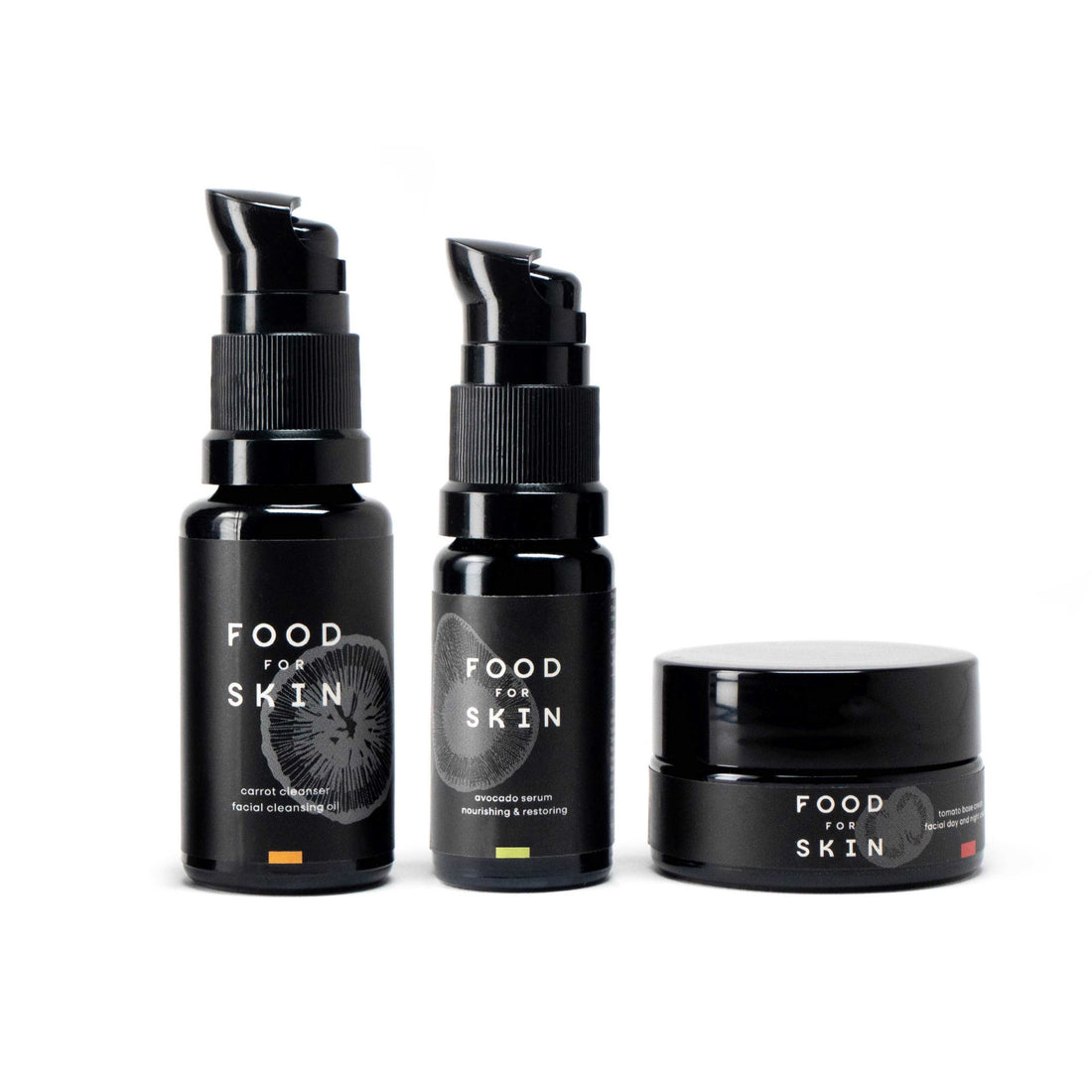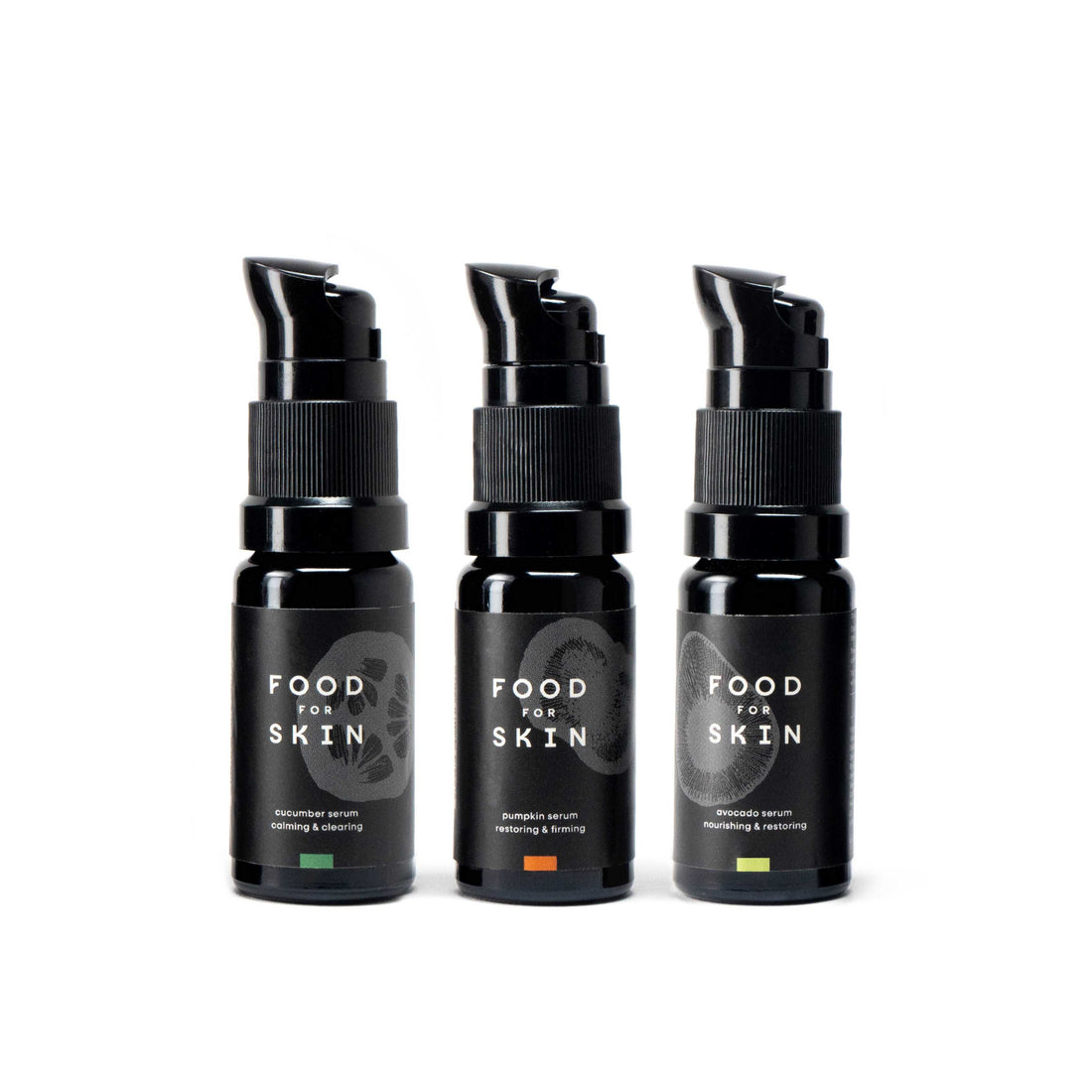Guest blog by: Marian Witte – naturopath, nutritionist, orthomolecular therapist and intestinal flora therapist in the practice NatuurVitaal.nl . Marian has been using Food for Skin skin care products for 2 years.
Food for beautiful skin
Your skin reflects your health. This is a common statement that contains a fair amount of truth. In addition, your skin is directly visible to those around you. This is why skin problems are often experienced as very annoying. Dry skin, acne, eczema, rough or sagging skin or excessive wrinkles, they are common. But what can you do yourself? Of course, good, natural facial care is important. Preferably without disruptive substances. The skin care of Food for Skin is of course a good example of this. But you can also take good care of your skin from the inside. Do you want to know how your skin works in general, which substances you need and what you can eat to pamper your skin? Then read on.
You probably don't think about it every day, but what does your skin actually do? Really quite a lot. Did you know that your skin is your largest organ? It literally forms the barrier between your outside and inside world. Your skin ensures, among other things, the production of vitamin D, maintaining a stable body temperature and not losing too much moisture. Your skin also ensures that you can feel; cold and warm, but also vibrations, itching and pressure. By sweating you can also get rid of waste products through your skin. In short, our skin is very versatile and deserves good care from the inside and outside.
What is our skin made of?
Our skin consists of several layers. The epidermis, dermis and subcutaneous connective tissue. Your epidermis is renewed approximately every month. In the epidermis, new skin cells are constantly being made, and they also die off. There are also pigment cells in the epidermis, which have a function in tanning in the sun.
The dermis is the second layer of skin. This layer contains blood vessels, but also lymphatic vessels, nerves and sebaceous glands. The blood vessels provide the supply of nutrients while the lymphatic vessels ensure the removal of waste products from the skin. The sebaceous glands keep your skin slightly oily and protect it from drying out. In the dermis you will also find collagen and elastin, which help keep your skin firm and elastic. The dermis is important because it also provides nutrition to the upper skin layer, the epidermis.
The third layer of the skin is the subcutaneous connective tissue, this layer offers protection to the underlying organs. In this layer of the skin you will find blood vessels and fat, which insulates and provides energy.
Healthy skin, healthy intestines
Good digestion and bowel function are important for beautiful skin. Everything you eat must be processed by your digestion into food for your body. This food is distributed through your bloodstream and therefore also ends up in your skin. It is therefore very important that your digestion works well. Are you sensitive to certain nutrients, do you have variable bowel movements or a bloated stomach? Then it is advisable to work on this. In many cases, this will also improve your skin complaints. Think of fiber, sufficient fluid, healthy fats and of course sufficient vitamins, minerals and proteins.
Which foods are good for your skin?
Many of the foods that are healthy for your gut are also important for your skin. But which foods are really good for your skin? Below you will find no less than 11 boosters for your skin!
1. Collagen and chondroitin
As you have read before, the dermis contains collagen . As you get older, the collagen content decreases and it can be useful to supplement this with your diet. If you eat animal products, bone broth is a great skin booster. Bone broth contains a lot of collagen and chondroitin. The skin of chicken or salmon also contains collagen. In addition to your skin, your intestines, joints, tendons and all your connective tissue also benefit from this. There is no vegetable collagen. If you eat vegan, it is best to eat vegetable foods that contain a lot of vitamin C and stimulate collagen production in your body. You can read more about this below.
2. Vitamin A
Beta-carotene or carotenoids are also called provitamin A. These substances can be converted into vitamin A in your body. Vitamin A is necessary for cell division and plays a role in preventing or improving eczema, psoriasis and acne. You can find this vitamin in many vegetables and fruits, such as pumpkin, sweet potato, carrot, tomato and mango. Vitamin A can also be found in animal products such as eggs and liverwurst. Some supplements also contain vitamin A, but be careful with this, because too much vitamin A can be harmful.
3. B vitamins
B vitamins are very important for healthy skin. There are various types of B vitamins. They are water-soluble and work together. Deficiencies of one or more B vitamins can lead to acne, eczema, rough skin, premature wrinkling and flaky skin around the nose, mouth and eyes. It is therefore advisable to get enough of these B vitamins. Some B vitamins are produced in healthy intestines. Here too we see the relationship with your digestion.
Meat, fish and shellfish, poultry, eggs, dairy products, legumes, leafy vegetables, seeds, among other things, provide us with many B vitamins. Folic acid - also called folate or b11 - is mainly found in legumes and in green leafy vegetables such as spinach, endive and romaine lettuce. Steam or stir-fry your vegetables briefly, so that as much folic acid and other vitamins as possible are retained. B12 is mainly found in animal products such as fish, eggs and chicken. These animal products also contain other B vitamins, including: B2, bB5, B8. If you eat mainly plant-based, it may be advisable to use a good B12 supplement.
4. Vitamin C
Fruits and vegetables contain all sorts of substances that support the skin. Take vitamin C, for example. This vitamin promotes the production of collagen in your body. Foods that contain a lot of vitamin C are: kale, oranges, and bell peppers.
5. Vitamin E
Vitamin E provides protection against free radicals and inflammation. Vitamin E can be found in fish, sesame oil and avocado.
The Food for Skin products also contain vitamins A, B, C and E. Curious which ones? Read it here!
6. Zinc
Zinc is an important trace element that helps your skin to recover, because it plays a role in cell renewal. It is also an antioxidant that protects your cells. A zinc deficiency can be related to pimples or acne. In addition, zinc makes an important contribution to the formation of stomach acid. Stomach acid is necessary for good digestion and good digestion is important, because it ensures that important substances are absorbed and end up where you need them. Fish, shellfish and crustaceans are good suppliers of zinc.
7. Proteins
Proteins ensure that your body can perform repair work, also in the skin! Animal foods such as fish, meat, eggs and dairy contain the important protein lysine. If you eat plant-based, choose nuts, seeds, kernels, lentils, beans and legumes. Pay attention to your lysine intake, because it is less common in plant-based foods.
8. Sulphur-rich foods; MSM
Sulfur is very important for healthy skin. MSM stands for Methylsulfonylmethane and is good for your skin, hair and nails. It plays an important role in building and keeping your connective tissue strong and it has an anti-inflammatory effect. A deficiency can lead to dry skin. Foods that are rich in sulfur are animal products, such as mussels, fish, chicken and eggs. Sulfur can also be found in nuts. Think of Brazil nuts and almonds. In terms of vegetables, you will find a lot of sulfur in Brussels sprouts, broccoli and the cabbage varieties white, red, green and savoy cabbage.
9. Good fats, omega 3
Omega 3 is an important fatty acid for healthy skin. Omega 3 fats help your skin stay hydrated and provide thicker, supple skin. They also help reduce inflammation in acne, redness or psoriasis.
Fatty fish contains a lot of omega 3. The smaller the fish, the less it is polluted. Think of sardines and herring. But salmon and mackerel also provide omega 3.
Plant-based omega 3 fatty acids can be found in algae oil or walnuts.
An indirect way to improve your fatty acid status is Chia seeds. These contain ALA, a fatty acid that can be converted by the body into omega-3 fatty acids. Note: this conversion does not seem to happen easily for everyone, so it is not always an efficient way to improve your fatty acid status.
10. Anti-inflammatory herbs
If you suffer from acne, rosacea or eczema, the above foods are definitely recommended. But perhaps anti-inflammatory herbs can also work well. These are turmeric, ginger and Mediterranean herbs, such as basil, oregano and thyme.
11. Moisture
Drinking enough is important for your skin. This way you can properly remove your waste products and hydrate your body and skin. Water is very healthy, preferably as pure as possible. But herbal teas are also very suitable. Think of ginger, turmeric, peppermint, camomile. Vary as much as possible. Drink at least 6-8 large glasses of water or herbal tea per day. Do not overdo it, because if you structurally drink too much water that is also not healthy and you can also lose minerals.
What food is good for the skin
The summary? Your skin is an important organ for your health and your appearance. Good nutrition for your skin is diverse and contains sufficient healthy fats, proteins, vitamins and minerals. Healthy digestion and intestinal function are the basis for healthy skin.
That vitamins and minerals are good for your body is clear! But your skin, your largest organ, also gets very happy from these vitamins. Read more about which vitamins are good for your skin, the Food for Skin skin philosophy or order your products in the shop .
It is impossible to be complete in an article about nutrition and the skin and the prevention or remedy of skin problems. Do you want to work on your nutrition, digestion, or improve your skin from the inside? Then feel free to contact Marian Witte of NatuurVitaal. She will be happy to help you with a personal plan of action. Read more about her and her approach here .
Are you not getting enough vitamins from your daily diet? Then choose pure, clean supplements such as Goldea. This is sustainable, made in the Netherlands with only the best from nature. Without artificial plastics!

